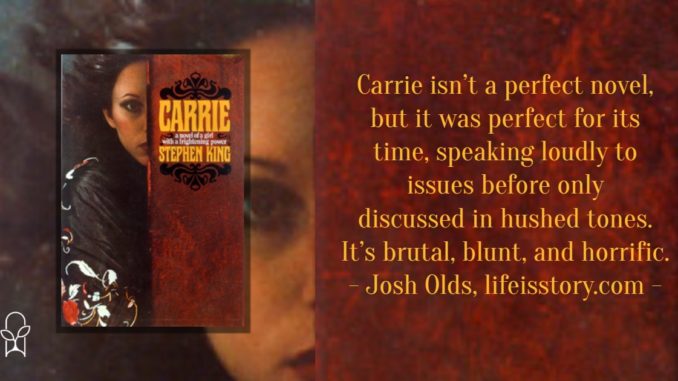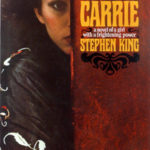
Also by this author: Finn, Gwendy's Final Task
Published by Doubleday on April 1974
Genres: Fiction, Horror, Suspense, Thriller
Buy on Amazon
Goodreads

Stephen King's legendary debut, about a teenage outcast and the revenge she enacts on her classmates.
Carrie White may be picked on by her classmates, but she has a gift. She can move things with her mind. Doors lock. Candles fall. This is her power and her problem. Then, an act of kindness, as spontaneous as the vicious taunts of her classmates, offers Carrie a chance to be a normal...until an unexpected cruelty turns her gift into a weapon of horror and destruction that no one will ever forget.
Carrie is perhaps better known for what it started than what it is. Although Stephen King had written three novels prior to Carrie (those being Rage, The Long Walk, and Blaze), Carrie was his first published work. The hardcover first-edition from Doubleday sold around 13,000 copies, but New American Library’s paperback version published a year later would eclipse one million sales. And in Carrie, you find the seeds of everything that he has written since.
Thematically, Carrie shows the beginnings of King’s long-running fascination with horror, revenge, and misused religion. Oftentimes, supernatural powers in the King universe simply are, without there being any explicable reason for them. (And usually, when King does attempt to explain, those explanations fall short.) You can see all of this in Carrie, where there is the assumption that her telekinesis is the result of her traumatic childhood but the whys and hows are never addressed.
Structurally, Carrie does not fall into the trap that later King novels sometimes do of being overly-long, bloated, and from an abundance of viewpoints. While the latter does get some play in the form of newspaper clippings, diary entries, and other methods of getting outside of Carrie’s head, those elements are easily the clunkiest part of the novel. Carrie is at its best when it stays as a self-contained epistolary, firmly within Carrie’s perspective. King’s use of brackets and italics to show us Carrie’s internal monologue, even within scenes of a third-person perspective, is well-done and fitting to the nature of the novel.
The novel itself is a simple story: Carrie White is a high-school student with latent telekinetic powers brought to power with her first menses. Carrie is an outcast at school, bullied by virtually everyone, and is abused at home by her mentally-ill mother in the name of religion. As Carrie discovers her powers, she uses them to take revenge on those who harmed her.
There’s a sense throughout the story that Carrie isn’t in full control of her powers. She doesn’t learn to use them or control them against others in any calculated way. Carrie learns to use her abilities in a neutral environment, but when faced with trauma, Carrie’s reactions are uncontrollable. King portrays Carrie’s telekinesis as an overflow of emotion; Carrie is as much a victim of her powers as the town of Chamberlain, Maine.
Again, Carrie is at its best when it retains its singular focus on Carrie. The newspaper clippings, police reports, and portions from other voices fall flat. Not only do they take us away from Carrie’s perspective—easily the most engaging and entertaining perspective available—but they also don’t have their own distinct voices. Sue Snell’s biographical entries read no differently that the newspaper scenes. In the audio book version, some care is taken to change this via tone of voice and manner of speech, but it still ends up being an unwelcome intrusion for the reader, who really just wants to get back to Carrie.
Carrie’s success has a lot to do with the era in which is was published, right between Rosemary’s Baby and The Exorcist, as the theme of horror movies shifted toward the human element. Carrie captured the zeitgeist of the mid-1970s, in terms of literature, cinema, and culture. Culturally, Carrie spoke to the rise of feminism and the empowered woman. The 1970s saw a generation entering high school that had been deeply affected by the sexual revolution of the 1960s and the usually-religious backlash that came with it. No wonder then that the theme of misused religion is combined with telekinetic powers brought on by menses to create a novel about the destructive power of Woman. King doesn’t portray this is good or bad, perhaps simply saying that the power of women cannot be denied. In Danse Macabre, he writes:
Carrie White is a sadly misused teenager, an example of the sort of person whose spirit is so often broken for good in that pit of man- and woman-eaters that is your normal suburban high school. But she’s also Woman, feeling her powers for the first time and, like Samson, pulling down the temple on everyone in sight at the end of the book. Heavy, turgid stuff—but in the novel, it’s only there if you want to take it.
Carrie isn’t a perfect novel, but it was perfect for its time, speaking loudly to issues before only discussed in hushed tones. It’s brutal, blunt, and horrific. Not scary, necessarily, but horrific. He addresses the psychological effects of bullying (something seen again in Rage). He portrays religion as having the capability of being traumatizing. Even the lack of sex education is shown as something horrifying, as Carrie legitimately does not know what is happening to her body during her first menses and feels like she is dying. Fear of death, ignorance of one’s own body and its capabilities, fear of religion, fear of the social structure: all of these things are distinctly human horrors that don’t need elements of the supernatural to make them scary, but King uses the supernatural to drag them into the light to explore our normal, everyday fears in a decidedly horrific fashion. Carrie is an imperfect, but strong novel that is sometimes overshadowed by everything it launched, but it stands on its own merits as a stunning debut for the author who would become known as the King of horror.

